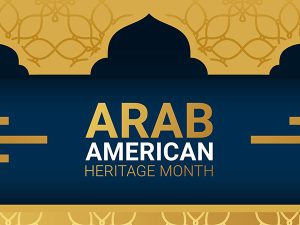
Last year, President Biden became the first U.S. president to declare April as National Arab American Heritage Month, in recognition of the contributions of Arab Americans to the United States that are as old as the country itself. During the month of April, Arab Americans are celebrated and recognized for their achievements, backgrounds, traditions, and their immeasurable contributions to the nation. Taleb Al-Adbah, first year doctoral student in Strategic Communication and GTA from Qatar, wrote it best when he talked about the components that make up Arab culture and identity.
Taleb Al-Adbah, first year doctoral student and GTA from Qatar:
“Arab culture is fascinating and complex tapestry of values, traditions, and customs that have been shaped over thousands of years. At its core, Arab culture is defined by a strong sense of identity and unity, which is grounded in a deep respect for family, community, and tradition.”
“To truly understand what Arab means, one must look beyond language and religion and explore the rich and diverse cultural heritage of the Arab world. Arab culture is built on the foundation of generosity, collaboration, and loyalty, which are deeply ingrained in the everyday lives of Arab people.”
“Generosity is a central tenet of Arab culture, as exemplified by the wide range of dishes that are prepared for special occasions and events. From Ramadan to Eid, Arab people take pride in their food and are eager to share it with their guests and family members. Meals are often enjoyed in large groups, symbolizing the generosity that is at the heart of Arab culture. Collaboration is also a key value in Arab culture, which places great importance on family and community ties. This sense of collaboration is reflected in the strong bonds of friendship that are formed between Arab people. When an Arab considers someone a close friend, they are like a member of their family.”
“Loyalty is yet another important value in Arab culture, which is deeply rooted in a sense of pride and identity. For Arab people, being loyal to their group or nationality is an essential aspect of their identity and reflects their deep connections to their cultural heritage.”
“It is important for people to understand Arab culture, not only to appreciate its rich and diverse heritage, but also to foster greater cross-cultural understanding and respect. By learning about Arab culture, people can move beyond stereotypes and misconceptions and develop a more nuanced understanding of the complexities of Arab society. This, in turn, can lead to stronger relationships and collaborations between individuals, communities, and nations, promoting a more inclusive and tolerant world.”
Al-Adbah also wrote about FIFA and Qatari traditions. Read more about it here: Taleb Al-Adbah on LinkedIn: #qatar #people #culture #hospitality #coffee
By Majdulina Hamed.
Published to Nicholson News on April 3rd, 2023.
If you have any news, accomplishments or highlights about your work or life, please be sure to share them with us, by emailing us at NicholsonNews@ucf.edu.